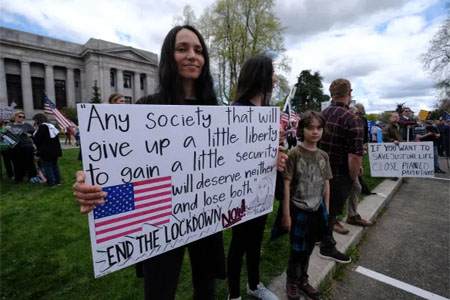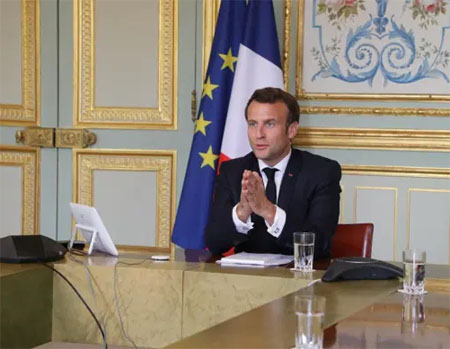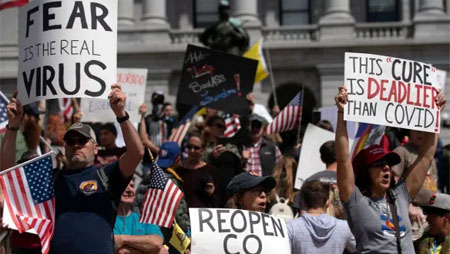|
The National Imaginary: Patriots and the Virus in the West
Vinay Lal
Part III of “A Global Pandemic, Political Epidemiology, and National Histories”
The contours of each country’s national history appear to be on display in the responses that have been witnessed across the world to the coronavirus pandemic. However, in suggesting this, I do not by any means wish to be seen as subscribing to the ideas of distinct personality traits that were behind “the national character” studies undertaken in the 1940s, a project that involved what were many of the leading anthropologists of that time, among them Margaret Mead and Ruth Benedict.

The argument rather is that someone such as the British Prime Minister, Boris Johnson, is perhaps more clearly implicated in such a view, judging from his observations about the “freedom-loving instincts” of the English people, and there is little doubt that “national character” studies were rather more common at that time as Orwell’s own essay is indubitably structured along those lines as well. It is not difficult to see why the temptation to produce types such as “the freedom-loving” English, the “yellow” or cowardly Japanese, or the militaristic German might not have been irresistible during the Second World War. Nor is it the case, keeping in mind the preceding two parts of this essay, that there is a seamless history of “Englishness” from Samuel Pepys writing in the second half of the seventeenth century to Britain’s response to the coronavirus pandemic, though it is striking that, to take one illustration, Britain was an outlier in its refusal to use quarantine in the nineteenth century when the question of controls over the movement of Muslim pilgrims came up at the Constantinople Sanitary Conference in 1866. The French and the Ottomans had pressed the Government of India to impose quarantines as one measure to control the spread of cholera among Muslim pilgrims, but they encountered a wall of resistance. Though the British argued that they were unwilling to consider any measures that were likely to alienate Muslim pilgrims, it is almost certainly the case that their then rigid adherence to the doctrines of free trade and free movement made them deeply suspicious of quarantine.
But let us return momentarily to George Orwell. The modern world, he says, cannot be understood apart from the “overwhelming strength of patriotism, national loyalty”, and perforce “one must admit that the divisions between nation and nation are founded on real differences of outlook.” The English are far from being the only people who claim to have a special attachment to liberty, and the question of French national characteristics has come up in the debate that is now animating France on whether the proposed deployment of smart phone tracking apps to inform people if they have come in contact with an infected person can be reconciled with the tradition of individual liberties. In late March, the French interior minister dismissed the idea of digital tracking, which has thus far been used with remarkable success in South Korea to contain COVID-19, as anathema to “French culture”. The junior minister in the French government who is responsible for digital affairs and is charged with the development of the app, Cédric O, has similarly gone on record to suggest that the debate “has to do with French history and a sensitivity to freedom that is inherent to French culture.” The supposition is that France as a constitutional democracy has a long-standing commitment to the “rule of law”, and that the individual’s love of liberty, subject only to the constraint that such love should not constrain someone else from their rightful exercise of liberty, is inextricably interwoven into the “rule of law”; correspondingly, Asian nations, even when they, as may be said of present-day South Korea, display democratic features, have only a historically contingent relationship to the idea of freedom as it is not intrinsic to their cultures.

The official cue to frame the debate as one pitting the apparently severe constraints on freedom of movement deemed necessary to mitigate the coronavirus against the cultural and political inheritance of the French people may have come from the French President, Emmanuel Macron. In addressing the nation on April 13th, he expressed the hope that the discussion in the National Assembly would make it abundantly clear to the nation that “under no circumstances should the coronavirus weaken our democracy or infringe on [our] civil liberties.” It is telling, however, that if French officials have invoked the cherished principles of the French Revolution and its call to liberté, égalité, fraternité, they have not taken recourse to the idea that the French have an inalienable right to frequent their neighborhood café for the customary coffee or aperitif. The English claim their liberties only for themselves: as Orwell would have it, the English like their pub and their “nice cup of tea”, and are at heart a nation of flower-lovers, stamp-collectors, coupon-snippers, darts-players, and crossword-puzzle fans. They had an empire, too, as Orwell—who was born as Eric Arthur Blair in Motihari, in present-day Bihar in India, and served in the Imperial Police Service in Burma from 1922 until his resignation in March 1928—knew all too well, but “the patriotism of the common people is not vocal or even conscious.” France, that other freedom-loving nation on the continent, has in contrast always thought of itself as a country that sets an example to others: thus, in the present debate on whether digital apps might be used to mitigate the spread of COVID-19, Sacha Houlié, a French lawmaker from President Macron’s own party, La République En Marche, put it quite candidly: “We are France. In terms of civil liberties, being France means something. It means that, in a sense, the world is watching what we do.”

The world has better things to do than watch France. But let us put that aside. Given the long histories of European colonialism, and the unspeakable brutalities of colonial wars, one might with very good cause forthright dismiss all talk of the supposedly intrinsic attachment to the ideas of liberty among the British, French, or indeed other Europeans as nothing more than bunkum and balderdash. To do so would be to fall grievously into the error of supposing that unearthing the hypocrisies of peoples, or nations, furnishes enough warrant to dismiss the motive force of the national imaginary in shaping a country’s social response to something like the coronavirus pandemic. The demonstrations over the last few weeks in the United States against the restrictions that have been placed on the movement of people, as well as against the mandated closing of schools, universities, government offices, indeed all “non-essential” businesses and private enterprises, provides yet another if more muddled illustration of how national histories and notions of national identity continue to play a critical shape in shaping the political epidemiology of a global pandemic such as COVID-19. Demonstrations had broken out, as reported in major newspapers and media outlets, in mid- to late-March in Michigan, Ohio, Idaho, Kentucky, Washington, and other American states against the continued lockdown and stay-at-home orders that are now common to nearly all parts of the United States. The protestors, judging from interviews, newspaper accounts, statements released to the press, and the placards that they have been carrying, have expressed a strong desire to be able to go back to work and have demanded that businesses, churches, and public spaces such as beaches be re-opened. “My constitutional rights are essential”, read one placard held by a supporter of the Michigan Conservative Coalition, while in Richmond, Virginia, demonstrators held placards bearing slogans such as “End the Shut Down” and “We Will Not Comply.” In Harrisburg, Pennsylvania, a boy held aloft a sign, “Freedom is Essential”, while another displayed a placard with a provocation, “Give me Liberty or Give me COVID-19.” Whatever one may make of the inexpediency and perhaps insensitivity of such demonstrations, they cannot be dismissed merely as expressions of the entity to which modern man has been reduced: homo economicus. The demonstrators may want to return to work, but the recourse to another language—freedom, liberty, and rights—also impresses.

Trump, a voracious consumer of Fox News, which has been vocal in its sharp dismissal of state governors who have insisted on more rigorous lockdowns as “authoritarian”, himself has egged on the demonstrators with the all-caps tweets with which his name is now indelibly linked: “LIBERATE MICHIGAN!” and “LIBERATE MINNESOTA!” Virginia, with its (in the American experience) hallowed history as the birthplace of some of the country’s most well-known founding fathers—Washington, Jefferson, James Madison, George Mason, among others—has especially rankled Trump as a state that has gone over to the other side and Trump has called to “LIBERATE VIRGINIA, and save your great 2nd Amendment. It is under siege.” There is ample evidence that the demonstrators have in part also been instigated by right-wing groups, white nationalists, militant supporters of the constitutional right to bear arms, anti-abortion activists, religious fundamentalists, even—what is more particular to the US with its own particular histories of resistance to any state-imposed intrusions on private life—anti-vaccination groups. Some of the protests have been funded by innocuous sounding organizations such as the Idaho Freedom Foundation, the Michigan Liberty Militia, and the Michigan Freedom Fund, but the link of some organizations to neo-Nazi ideology, white nationalism, or to such causes as the state support of Christianity or the militant advocacy of the unchecked right to private ownership of arms cannot be doubted.
(to be continued)
Posted on May 3, 2020
[Vinay Lal is Professor of History and Asian American Studies at UCLA. He writes widely on the history and culture of colonial and modern India, popular and public culture in India, historiography, the politics of world history, the Indian diaspora, global politics, contemporary American politics, the life and thought of Mohandas Gandhi, Hinduism, and the politics of knowledge systems.]
Courtesy: https://vinaylal.wordpress.com/
Back to Home Page
Frontier
May 7, 2020
Prof. Vinay Lal VLAL@HISTORY.UCLA.EDU
Your Comment if any
|
